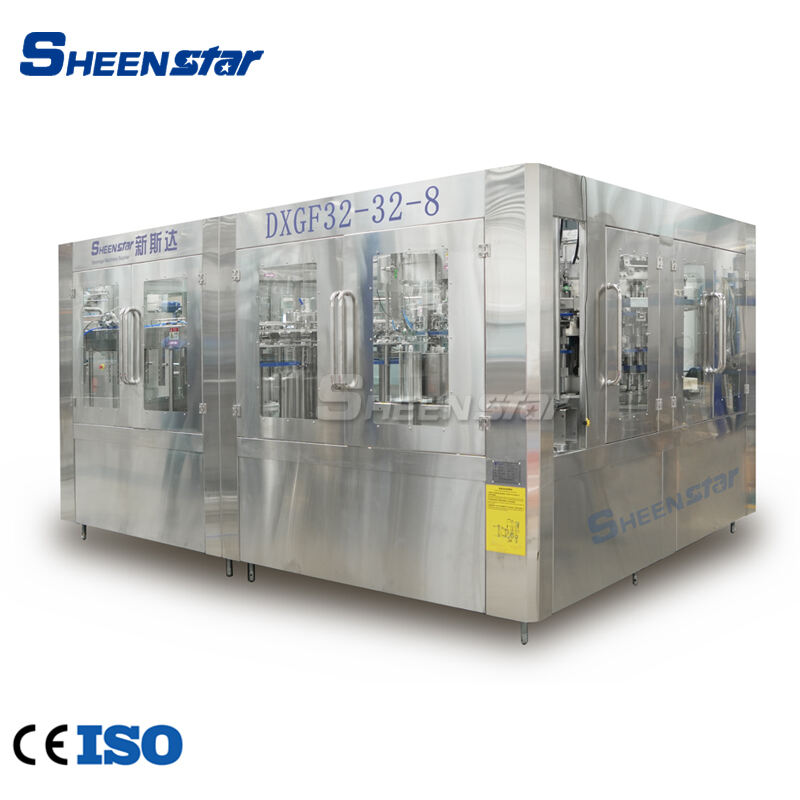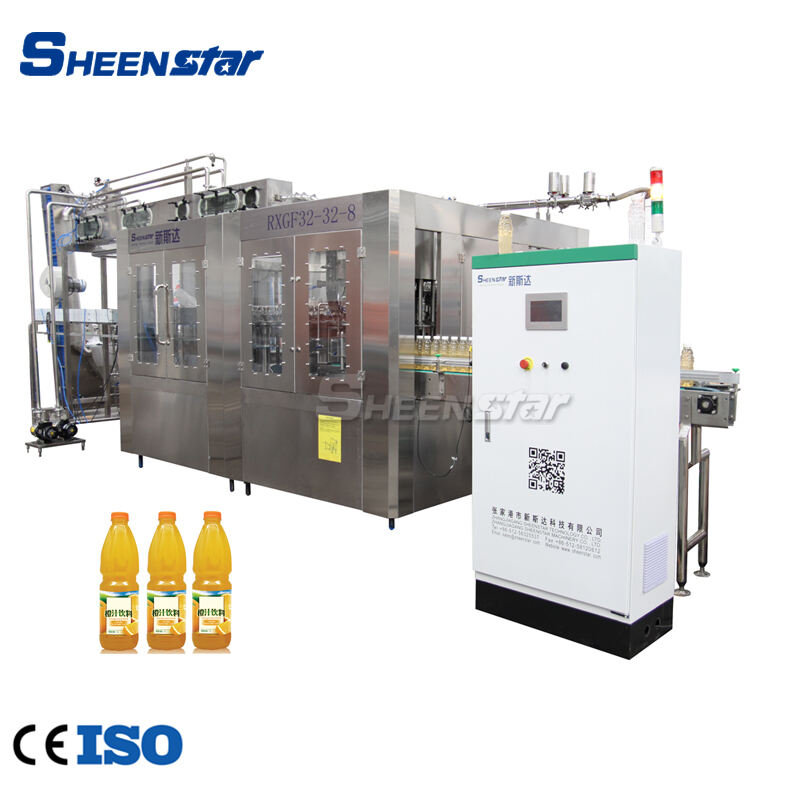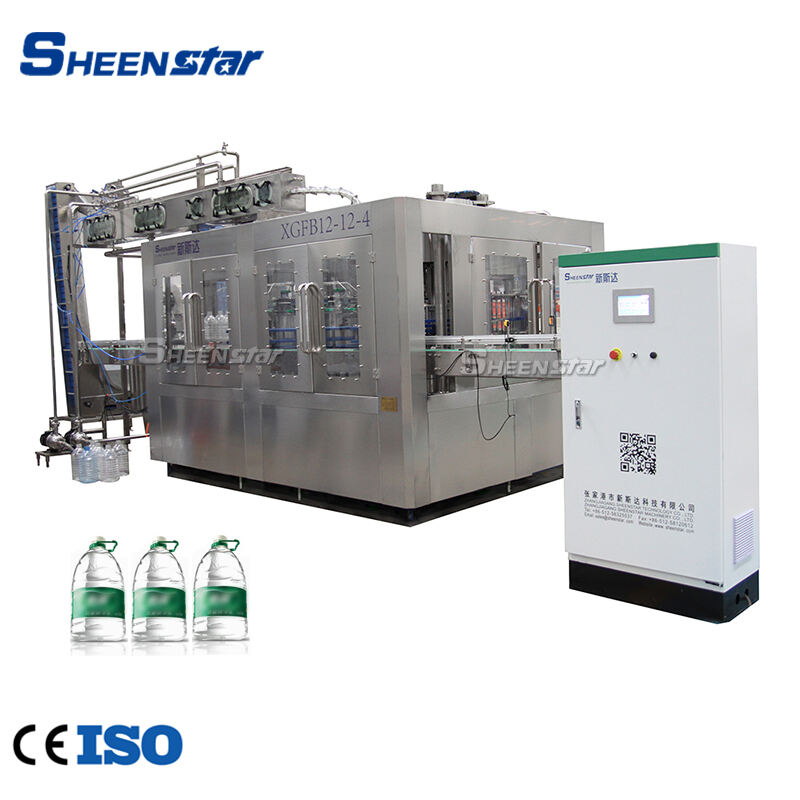Filling a soft drink tin can with liquid is part of the massive beverage market and these light syrup to soft drinks have become popular worldwide. But with consumer habits changing, and more of a focus on sustainability from businesses all over the world - these machines need to be updated for the future. A battle to make their machines as technology savvy and efficient in nature has started, then comes the ecological measures followed by safety of products; soft drink tin can filling machinery seems avant-garde.
The changing scenario in the beverage culture shows that more and more trends are moving towards healthy living, personalization as well keeping care of mother earth. The filling machines of tomorrow will be modular, to meet the requirements in view. That speed will allow manufacturers to shift production lines promptly - for different beverages or cans of varying size. The inclusion of artificial intelligence (AI) and the Internet of Things (IoT), for example, will allow more seamless predictive maintenance processes that in turn minimizes downtime while simultaneously maximizing production schedules. In addition, given the holistic view of fully automated and interconnected systems for an integrated supply chain from raw material handling to packaging and distribution.
Today's modern filling methods are more efficient, meaning they not only speed up fill operation but also reduce losses. High-speed cameras and sensors in the filling systems guarantee accurate fill levels, identify defective cans and thus enable excellent quality control. Breakthroughs such as aseptic filling lines and modular systems for mixing on demand, additionally enhance productivity while lowering the risks of contamination issues resulting in flawless production. Such advancements do not merely lead to higher productivity and lower costs, allowing operations to better compete in international markets.
Sustainability is not an option but a requirement, and soft drink can filling machinery has begun to make adjustments. Machines are consuming less power with the help of energy-efficient motors and optimized hydraulic systems while, machines designed for water conservation require least fresh water. Moreover, both usage of recyclable materials in machine parts and push for loop-shaped recycles economic can practice also demonstrate the industry's dedication to circular economy principles. Filling lines strive to be as efficient and sustainable as possible, with the most cutting-edge adding carbon capture in order to further cut emissions: a prime example of how eco-innovation can truly permeate every corner of production.
In the food and beverage industry it is crucial to ensure that products remain fresh and safe. It is a combination of UVC irradiation and HPV treatment, facilitated by next generation filling machinery for the production of sterile fill-finish solutions. This kills the bacteria and pathogens, resulting in each sealed can being perfectly intact. In addition, the traceability systems in place within these machines facilitate on-the-spot identification and quarantine of any production batch should safety issues arise. Manufacturers who invest in these technologies help build consumer trust and adhere to stringent regulatory standards.
The beverages modern market is constantly expanding to suit different tastes and lifestyles. This variety requires flexible filling machines, so that manufacturers can switch from carbonated drinks to energy drinks or flavored water and then back again - even into alcoholic beverages some day- without major reconfigurations. These machines are equipped with fast-change parts and rapid-fill parameter adjust software. This flexibility assists in getting products to the market quicker but also helps with factory utilisation enabling businesses to remain agile in a rapidly changing industry.
To sum up, the development direction of tin can filling machines for soft drink is related to technology innovation and sustainability & adaptability. Manufacturers will continue to streamline their designs for higher efficiency, improved product safety and reduced environmental impact. It means not only they satisfy the market request also help a positive contribution to worldwide sustainable manufacturing practices. FOR THE INDUSTRY The evolution of these machines is representative on the ever-changing and rejuvenating beverage industry itself.
The beverage landscape is ever-changing, with trends leaning towards healthier options, customization, and reduced environmental impact. In response, the future of filling machines is geared towards modularity, allowing manufacturers to swiftly switch production lines to accommodate new beverages or can sizes. Artificial intelligence (AI) and Internet of Things (IoT) integration will facilitate predictive maintenance, reducing downtime and optimizing production schedules. Furthermore, the development of fully automated and interconnected systems will streamline the entire supply chain, from raw material handling to packaging and distribution.

Advanced filling technologies are revolutionizing the industry by significantly boosting throughput and minimizing waste. Precision filling systems equipped with high-speed cameras and sensors ensure accurate fill levels, while also detecting and rejecting cans with defects, thereby maintaining quality control. Innovations like sterile filling environments and inline blending systems further enhance efficiency by reducing cross-contamination risks and streamlining recipe changes. These advancements not only increase productivity but also contribute to cost savings, making operations more competitive in the global market.

Sustainability is no longer a choice but a necessity, and soft drink can filling machinery is evolving to meet this challenge head-on. Energy-efficient motors and optimized hydraulic systems reduce power consumption, while machines designed for low water usage contribute to water conservation efforts. Additionally, the adoption of recyclable materials in machine components and the promotion of closed-loop recycling systems for cans underscores the industry's commitment to circular economy principles. Some cutting-edge filling lines even incorporate carbon capture technology to mitigate emissions, demonstrating that eco-innovation can permeate every aspect of production.

Consumer safety and product freshness are paramount in the food and beverage sector. State-of-the-art filling equipment incorporates advanced sanitation measures such as ultraviolet (UV) sterilization and hydrogen peroxide vapor (HPV) treatment to create aseptic filling environments. This eliminates bacteria and pathogens, ensuring the integrity of each sealed can. Moreover, traceability systems integrated within these machines allow for the immediate identification and isolation of any production batch should a safety concern arise. By investing in such technologies, manufacturers reinforce consumer trust and comply with stringent regulatory standards.
Sheenstar offers complete soft drink tin can filling machineproduction systems, including pure water, fruit drinks, wine, soymilk, oil, yogurt. Containers made plastic, glass barrels of 5 gallon cans. The entire line comprises water treatment system, beverage pre-treatment system, injection molding machine and bottle-making machine, refilling filling machine, labeling system, packing machine, other machinery.
Sheenstar has 15 Years rich soft drink tin can filling machinein the field of beverage machinery includes production, R and D, sales and after-sales service certified through ISO9001, CE, SGS various other certifications. We can set up the best machines customers based on the market research, inquiry, and budget. The customers are very satisfied with products and services. Sheenstar has outstanding reputation in the beverage and water machinery sector.
We offer soft drink tin can filling machine service that allow us to tailor filling solutions the particular requirements of our clients. We can offer a factory layout diagram along with the bottle's label. When the machine is in production, we will also supply a production schedule. At the same time, we have a professional after-sales service team that can provide prompt and professional technical assistance. Our engineers will visit customer factory install test the machines and instruct the employees on how to use and maintenance machines correctly making sure that they operate in a normal manner the equipment as well as the smooth advancement of the production process our customers.
We have an soft drink tin can filling machineknowledgeable quality inspection team, from the procurement of raw materials to production manufacturing. Our quality inspection department is on the lookout for every detail ensure that every piece of equipment exceeds the highest quality requirements. Materials are SUS304/SUS316 of superior quality, easy to clean have an extended life. The electrical components are internationally renowned brands offer good quality, good service and after-sales services.
The modern beverage market is characterized by a diverse range of products catering to niche tastes and lifestyles. Flexible filling machines are key to addressing this variety, enabling manufacturers to swiftly pivot production from carbonated drinks to energy drinks, flavored waters, or even alcoholic beverages without major line reconfigurations. These machines feature quick-changeover parts and software that can adjust filling parameters at the touch of a button. This versatility not only accelerates time-to-market for new products but also maximizes factory utilization rates, ensuring businesses remain agile in a fast-paced industry.
In conclusion, the future of soft drink tin can filling machines is intrinsically linked to advancements in technology, sustainability, and adaptability. As manufacturers continue to innovate, they are poised to deliver higher efficiency, enhanced product safety, and reduced environmental footprints. In doing so, they cater not just to market demands but also contribute positively to the global goal of sustainable manufacturing practices. The evolution of these machines mirrors the dynamic nature of the beverage industry itself—ever-changing, always refreshing.